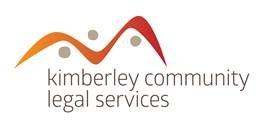Legal Services
You can read about what services KCLS offers by downloading our brochure here.
KCLS is often the first stop for many community members that need to engage in the legal system. Given the scope and flexibility of practice, KCLS can provide legal advice and representation or alternatively, link the client with an appropriate service by way of facilitated referral.
KCLS’s core legal practice areas include the following matters
Family Law
Parents and carers often approach us for advice and assistance with issues they're facing in their family. KCLS can provide people with legal advice and assistance on legal issues involving the care of children and young people, as well as dealing with family violence.
Relationship or marriage break-ups can be difficult and complex for anyone to deal with when arrangements need to be made for the care of children.
The law says it’s important for children to have a meaningful relationship with each of their parents and other important people in their lives (such as grandparents), as long as the relationship is in the children’s best interests and doesn’t put them at risk of harm.
A lawyer at KCLS can speak to you before you attend FDR to advise you on your rights and options before you go to FDR. If you can't reach an agreement at FDR or your situation is too urgent to wait for FDR, you can speak to a lawyer at KCLS about your options.
Restraining orders
Many men, women, and children live with or witness family violence regardless of their social or cultural background. Family violence is not just physical abuse and includes harassment, control of money, and emotional abuse.
If you're experiencing family violence you can speak to a KCLS lawyer for advice on how to apply for a violence restraining order to protect yourself or your children.
- Family Violence Restraining Orders for family members
- Violence Restraining Orders for other people not family
- Conduct Agreement Orders to resolve cases without a final order hearing
- Misconduct Restraining Orders for destructive behavior outside family
- Temporary Police Orders to stop family violence
When you rent a house, you have a lot of rights and responsibilities. KCLS lawyers can help you if your rights are being ignored or breached by your landlord.
Tenancy
Your Rights When Renting a House
To have a safe and secure house
To have any maintenance completed quickly
Not to have to pay for damage that is 'fair wear and tear'
To use and enjoy your house
These rights are found in the Residential Tenancies Act 1987 (WA). If you think your rights have been breached, you can ask us for legal advice.
Other Issues We Help With
Making an application for social housing and explaining the 'priority list' and the 'wait turn list'
Making an application to transfer between social housing providers
Understanding your Tenancy Agreement before you sign up
Appealing charges on your account that you don't agree with
Dealing with complaints from your neighbours
Giving up your house: there are lots of ways that tenancies can end
Getting your bond back
Care and Protection
When there are allegations of family violence, neglect, and/or emotional or physical abuse of a child, the Department of Child Protection and Support (CPFS) may intervene in the care of a child or young person. CPFS might ask to meet with you, or they might hand you some paperwork about your child or young person.
In these situations, a lawyer at KCLS can speak to you about how the child protection law works and advise you on your rights. We can also help you to develop plans, speak to CPFS, and tell your side of the story. You don't have to wait until you're in Court to speak with a lawyer. You can talk to a lawyer at KCLS as soon as you get paperwork from CPFS or are asked to have a meeting with them. It's usually better to speak to a lawyer as soon as possible, to see if things can be sorted out before Court. If you go to Court, we may be able to help you tell your story to the Court and CPFS.
Criminal Injuries
If you've been the victim of a crime, you can apply for compensation for the injuries you suffered, which is known as Criminal Injuries Compensation (CIC). KCLS might be able to help you with your claim for CIC, but if you want to claim a personal injury, you will be referred on to a different agency.
You may be eligible for CIC where:
An offender has been convicted
An offender is charged with an offence, but it does not go any further
You have reported the offence to police, but no person has been charged
An offender is acquitted, but you believe another person committed the offence
An offender is not mentally fit to stand trial or is acquitted due to unsoundness of mind
You have three years from the date of the incident to apply for CIC.
You can claim for physical injuries, mental and psychological injuries, loss of income, loss of future earnings and any expenses incurred by you as a result of the injuries.
